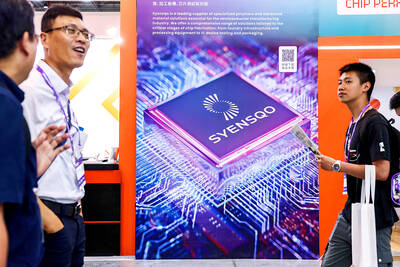The Fair Trade Commission (FTC) yesterday said it was suspending its review of Advanced Semiconductor Engineering Inc’s (ASE, 日月光半導體) bid to take over rival Siliconware Precision Industries Co (SPIL, 矽品精密) because the deal has fallen through.
The commission’s decision meant a victory for SPIL in the high-profile ownership battle, as ASE is now barred from launching a new round of tender offers to fully acquire SPIL within a year as the Company Act (公司法) stipulates.
However, ASE, the world’s largest chip packaging and testing services provider, is not likely to give up so soon.
ASE released a statement saying it will continue with our plan to acquire 100 percent equity interest in SPIL through all legally permissible means and avenues.”
The industrial consolidation will help the company cope with “intense and constant changes in the global semiconductor industry, as well as to ensure the sustained development of the Taiwanese semiconductor packaging and testing supply chain,” it said.
The FTC said in a statement that as “ASE’s tender offer has expired on March 17, there is no chance that the merger will happen. As a result, the commission will stop reviewing the case.”
ASE’s acquisition of a major stake in SPIL has raised anti-trust concerns and fears that the merger would undermine competition in the market.
The FTC on March 16, one day before the March 17 expiry date, said that the deal was complicated, and that before clarifying certain issues related to the potential merger, it could not decide whether it would approve the deal.
The FTC’s announcement essentially meant that the deal could not be completed.
On March 17, ASE said formally that the tender offer could not go through.
The commission’s approval is one of the deciding factors for ASE to clinch the NT$42.35 billion (US$1.3 billion) deal, along with a minimal purchase threshold of 5 percent of 770 million proposed SPIL shares.
The transaction, if approved, would help ASE expand its holding to 49 percent from the current 25 percent and pave the way for a full acquisition.
“We deeply regret and are extremely baffled by the FTC’s decision, which is completely without legal basis and violates the FTC’s own administrative precedents,” ASE said in the statement.
SPIL, which has repeatedly urged the commission to terminate the review of the acquisition deal since March 16, welcomed the FTC’s decision.

SEMICONDUCTOR SERVICES: A company executive said that Taiwanese firms must think about how to participate in global supply chains and lift their competitiveness Taiwan Semiconductor Manufacturing Co (TSMC, 台積電) yesterday said it expects to launch its first multifunctional service center in Pingtung County in the middle of 2027, in a bid to foster a resilient high-tech facility construction ecosystem. TSMC broached the idea of creating a center two or three years ago when it started building new manufacturing capacity in the US and Japan, the company said. The center, dubbed an “ecosystem park,” would assist local manufacturing facility construction partners to upgrade their capabilities and secure more deals from other global chipmakers such as Intel Corp, Micron Technology Inc and Infineon Technologies AG, TSMC said. It

EXPORT GROWTH: The AI boom has shortened chip cycles to just one year, putting pressure on chipmakers to accelerate development and expand packaging capacity Developing a localized supply chain for advanced packaging equipment is critical for keeping pace with customers’ increasingly shrinking time-to-market cycles for new artificial intelligence (AI) chips, Taiwan Semiconductor Manufacturing Co (TSMC, 台積電) said yesterday. Spurred on by the AI revolution, customers are accelerating product upgrades to nearly every year, compared with the two to three-year development cadence in the past, TSMC vice president of advanced packaging technology and service Jun He (何軍) said at a 3D IC Global Summit organized by SEMI in Taipei. These shortened cycles put heavy pressure on chipmakers, as the entire process — from chip design to mass

People walk past advertising for a Syensqo chip at the Semicon Taiwan exhibition in Taipei yesterday.

NO BREAKTHROUGH? More substantial ‘deliverables,’ such as tariff reductions, would likely be saved for a meeting between Trump and Xi later this year, a trade expert said China launched two probes targeting the US semiconductor sector on Saturday ahead of talks between the two nations in Spain this week on trade, national security and the ownership of social media platform TikTok. China’s Ministry of Commerce announced an anti-dumping investigation into certain analog integrated circuits (ICs) imported from the US. The investigation is to target some commodity interface ICs and gate driver ICs, which are commonly made by US companies such as Texas Instruments Inc and ON Semiconductor Corp. The ministry also announced an anti-discrimination probe into US measures against China’s chip sector. US measures such as export curbs and tariffs